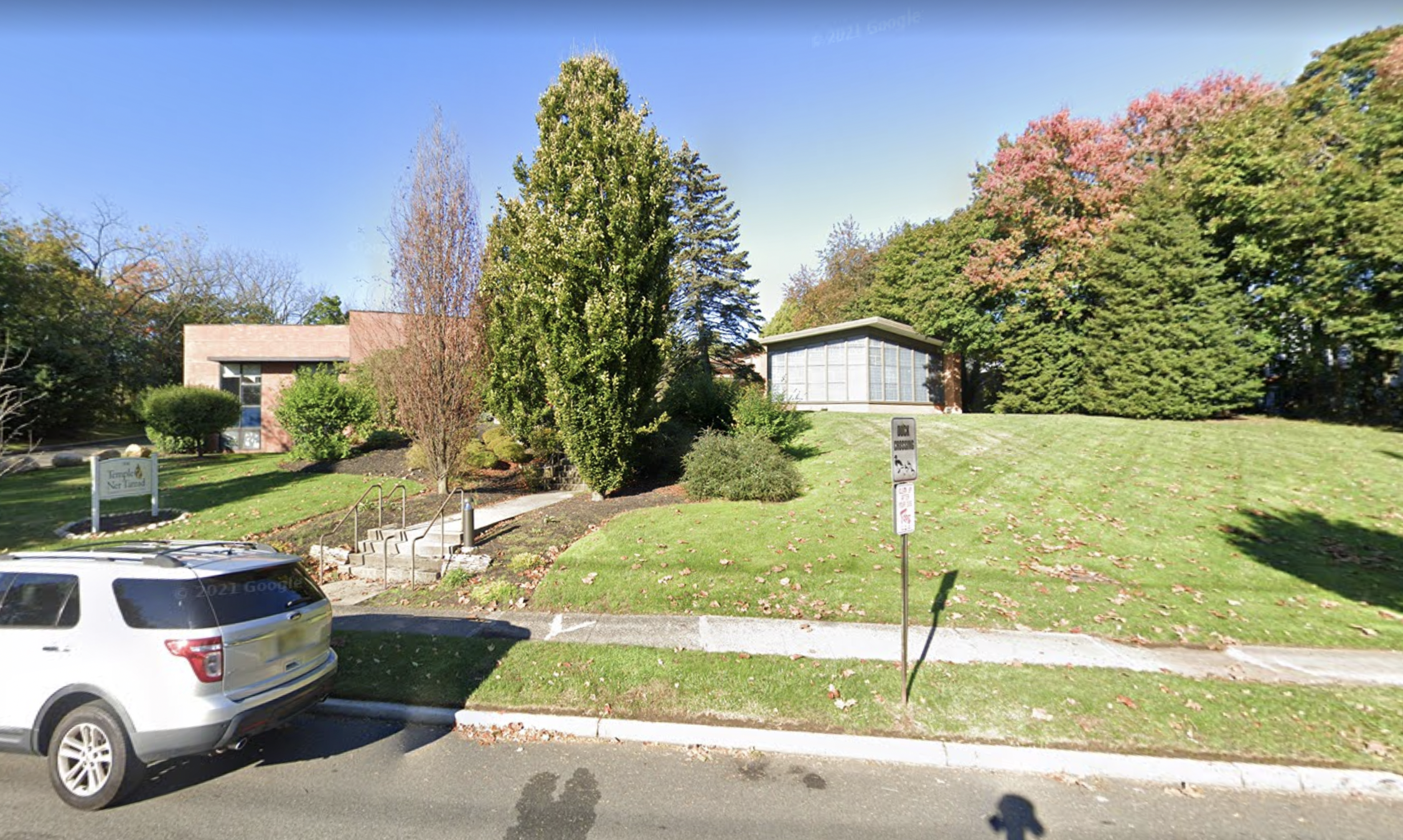Rabbi of firebombed N.J. synagogue: ‘We’ve unfortunately been preparing for this’
Temple Ner Tamid’s shatterproof doors withstood the Molotov cocktail thrown at it early Sunday morning

Temple Ner Tamid in Bloomfield, New Jersey, was targeted by a masked man who threw a Molotov cocktail at its door on Jan. 29, 2023. (Google Maps)
(JTA) — A New Jersey synagogue is crediting recent safety improvements after a Molotov cocktail thrown at its door overnight caused little damage.
Still, Temple Ner Tamid in Bloomfield canceled activities on Sunday as the police investigated, marking the second time in recent months that the suburban congregation suspended activities because of an antisemitic incident.
Last November, the Reform synagogue of about 500 families near New York City briefly closed its doors while the FBI investigated a “credible threat” against New Jersey synagogues; an 18-year-old man was later arrested for making a threat online.
The latest incident took place around 3 a.m. Sunday when, according to security camera footage, a man approached the synagogue and threw what appeared to be a Molotov cocktail, a homemade bomb, at the door before fleeing. The man was wearing a ski mask and a shirt that appeared to have an image of a skull and crossbones, according to a picture that police distributed.
The building suffered only superficial damage, an outcome that Rabbi Marc Katz attributed to the safety investments made over the past several years, funded largely by state homeland security grants. The synagogue has added shatterproof glass to its door and upgraded its security cameras, which generated a relatively clear image of the man who threw the device.
“Everything worked the way it was supposed to,” Katz told the Jewish Telegraphic Agency Sunday afternoon. “We’ve unfortunately been preparing for this day for a while and we were ready.”
The synagogue canceled religious school, where roughly 200 children had been expected, and a rehearsal for the year’s Purim play largely out of concern that it would be upsetting for community members to see evidence of the assault and the investigation, Katz said. On Monday, a scheduled book talk by Rabbi Joshua Stanton, whose recent book tackles the challenges facing American religious institutions, has been postponed to make way for an evening event focused on the incident.
But Katz emphasized, including in his communications to community members, that the community’s normal activities were also ongoing. On Sunday morning, he said, he had officiated at a baby naming, and other activities would proceed as planned on Monday.
Katz said there had been no warning prior to the Sunday incident. But he noted that Montclair has experienced multiple apparently antisemitic incidents in recent years, including swastikas found on playgrounds and etched on desks in the high school.
“Every few months, something happens. But this is the first time that there’s something directly against our congregation to this magnitude,” he said. “If things had been different, like even the wind blowing differently, we could be having a very different conversation. … That’s what’s so scary about this.”
Katz said that even as the incident had left him and his congregants shaken, it was not just antisemitic incidents such as the attacks on synagogues in Pittsburgh; Poway, California; and Colleyville, Texas that had created an atmosphere of fear in the community. He said that every year he asks teenagers in the congregation where they feel more unsafe, at synagogue or at school, and every year the answers come back split.
“Our kids are suffering and they’re not just suffering because they’re Jewish,” he said. “So we have to be responding with a bit of a wider lens even than just what our own community is facing.”
In his letter to congregants, Katz noted that Ner Tamid’s trauma stood alongside other crises in the United States, alluding to multiple shootings targeting Asians in California and the release of footage showing police officers beating a Black man to death in Memphis.
“This has been a horrible week for many, for the AAPI community, for the African American community, and yes, for us,” Katz wrote. “If you don’t know what to do in light of this, then offer up support to a community who is equally at a loss. Perhaps in our collective anger and grief, we can find a way out together.”
This article originally appeared on JTA.org.
A message from our CEO & publisher Rachel Fishman Feddersen
I hope you appreciated this article. Before you go, I’d like to ask you to please support the Forward’s award-winning, nonprofit journalism during this critical time.
We’ve set a goal to raise $260,000 by December 31. That’s an ambitious goal, but one that will give us the resources we need to invest in the high quality news, opinion, analysis and cultural coverage that isn’t available anywhere else.
If you feel inspired to make an impact, now is the time to give something back. Join us as a member at your most generous level.
— Rachel Fishman Feddersen, Publisher and CEO